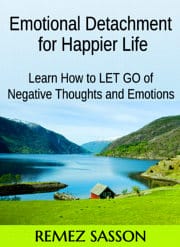
The quote “You can only lose what you cling to” provides profound insight into human nature and the source of pain. It is often attributed to Siddhartha Gautama, who is famously known as the Buddha.
This quote expresses a fundamental principle of Buddhist and Eastern philosophies, emphasizing the concept of attachment and its relationship to human suffering.
This timeless wisdom reminds us that our greatest sources of suffering often stem from our inability to let go of the things, people, or ideas we hold dear.
Browse our online courses on meditation, positive thinking, overcoming procrastination, confidence, and freedom from distractions.
In the pursuit of a happier and more fulfilling life, we often find ourselves grappling with one profound truth: attachment can lead to pain.
In this article, we will explore the profound concept that “you can only lose what you cling to,” offering real-life examples, practical advice, and insights on how embracing detachment can lead to a more liberated and joyful existence.
Understanding Attachment
Attachment is a fundamental aspect of human nature. We attach ourselves to people, possessions, beliefs, and even past experiences, often believing they define our identity and happiness.
However, this attachment can bring us unnecessary suffering when these attachments are threatened, altered, or lost.
Living Without Attachment and Clinging
Understanding the concept of attachment and practicing detachment can lead to a more joyful, liberated existence.
By letting go of what you cling to, you open yourself up to a world of possibilities and greater peace of mind.
As you navigate the complexities of life, remember that embracing detachment is the path to true freedom and happiness.
The Pain of Clinging
Clinging can cause pain. Here are a few examples:
1. Relationships: Think of a romantic relationship that ended abruptly. The emotional turmoil that follows often arises from our attachment to the idea of that relationship, not just the person.
2. Material Possessions: When your favorite belongings are damaged, lost, or stolen, you might experience grief and frustration simply because you are deeply attached to them.
3. Ego and Beliefs: Clinging to rigid beliefs about yourself or the world can lead to stress and conflict. When life challenges these beliefs, discomfort follows.
Examples of Detachment Leading to Freedom
1. Embracing Impermanence: Accepting that everything in life is impermanent and subject to change can be liberating. People and circumstances come and go, and knowing this can alleviate the pain of loss.
2. Forgiveness and Letting Go: Releasing anger and grudges, and forgiving those who’ve wronged you can free you from the heavy burden of resentment and anger.
3. Minimalism: Adopting a minimalist lifestyle reduces attachment to material possessions, allowing you to focus on what truly matters and find contentment in the simple things.
You will enjoy reading our emotional detachment quotes.
Attachment and Suffering
In Buddhism and Nonduality thought, attachment refers to our deep emotional and psychological connection to people, things, ideas, or experiences.
Attachment is a common human inclination. However, attachment is a primary source of suffering.
When we become strongly attached to something, we often become dependent on it for our happiness and well-being. This attachment creates suffering because, in life, nothing remains static, and change is inevitable.
The Concept of Impermanence
A core Buddhist teaching is the concept of impermanence. Everything in the world, including relationships, material possessions, and even our own lives, is in a constant state of flux.
We tend to resist or deny this impermanence, clinging to what we believe is stable and enduring. This resistance to change and attachment to the impermanent is where suffering arises. The more we cling to things that change, the more we suffer when they do change or are lost.
The Idea of Release and Liberation
The essence of the Buddha’s teaching and other Eastern teachings, such as Vedanta (Nonduality), is to free oneself from this cycle of suffering.
By recognizing the impermanence of all things and letting go of attachment, one can find inner peace, contentment, and liberation from suffering.
It’s not about abandoning or avoiding everything but rather understanding that clinging too tightly can lead to pain and that loosening those attachments can lead to freedom.
The Path to Liberation
The Buddha’s teachings and the teachings of other well-known spiritual teachers, Ramana Maharshi and Nisargaddata Maharaj, center on the pursuit of liberation.
To achieve this liberation, one must come to terms with the impermanence of all things and learn to let go of excessive attachments.
This quote, “You Can Only Lose What You Cling To,” emphasizes that by clinging less tightly to people, possessions, or ideas, we can reduce suffering and find a sense of freedom and inner peace.
Practical Advice for Embracing Detachment
- Meditation: Practicing meditation and mindfulness can help you observe your attachments and let them go more easily.
- Cultivate Gratitude: Focusing on what you have rather than what you lack can reduce the need for excessive attachment.
- Embrace Change: Embrace the idea that change is a constant in life. Instead of fearing it, welcome it as an opportunity for growth.
- Read about detachment and Nonduality: Read books and articles about the merits of detachment and how to embrace it in your life. Most literature about this topic comes from Eastern philosophies.
- Set Boundaries: Establish healthy boundaries in relationships to maintain your own sense of self while letting go of control over others.
Letting Go Leads to Peaceful and Contented Existence
In essence, this quote encourages us to reflect on the consequences of our attachments and to consider the benefits of practicing detachment.
By recognizing the transient nature of all things and learning to let go of what we cling to, we can alleviate much of the suffering that arises from the human tendency to resist change and impermanence.
It’s important to note that while this quote is associated with Buddhist and Eastern teachings and philosophies, its message can resonate with people of various backgrounds and beliefs.
This quote, attributed to Buddha (we are not sure whether these are his words or some other spiritual teacher said them), offers a universal insight into the human experience, reminding us that letting go of excessive attachments can lead to a more peaceful and contented existence.
Browse our online courses on meditation, positive thinking, overcoming procrastination, motivation, confidence, and freedom from distractions.
Image source – DepositPhotos


